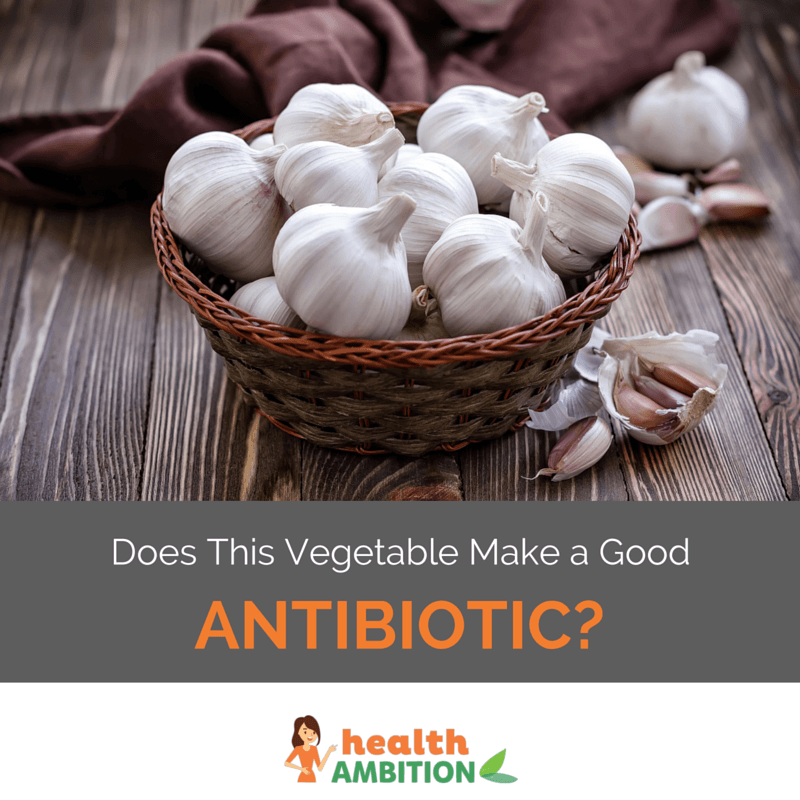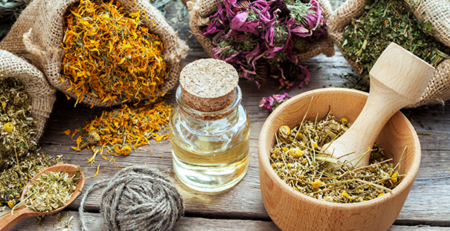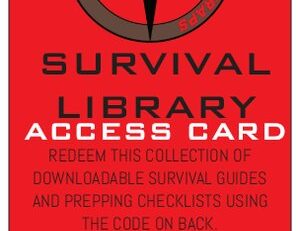Can You Use Garlic as an Antibiotic?
Most of us have taken antibiotics at some point in our lives. We’ve become accustomed to taking these powerful drugs when a natural remedy or simply resting would cure our ailment. This overuse of antibiotics has lead to stronger “superbugs” like MRSA.
Garlic has long been used as a natural antibiotic across the world. There are hundreds of studies detailing garlic’s effects on bacteria and other nasties. So, can you use garlic as an antibiotic? Read on to find out.
Garlic Basics
Garlic, or “allium sativum”, is a perennial plant in the onion family. It originated in central Asia but is now grown throughout the world.
The garlic bulb is commonly used in cooking and traditional medicinal remedies (source).

In 18th century France, gravediggers would drink crushed garlic in wine to protect them from the plague. In World War I and II, soldiers used garlic to prevent gangrene in their wounds. (source)
What is Allicin?
One of the main chemical constituents in garlic is called “allicin”. Allicin is activated when raw garlic is chewed, chopped or crushed.
Allicin responsible for many of garlic’s medicinal properties and also it’s strong, distinctive smell.
Allicin is deactivated by heat, e.g. in cooking. (source) Allicin content is also reduced in stale or old garlic cloves and commercial garlic powders. (source)
What is an Antibiotic?
Before we get into the details of garlic’s antibiotic powers, let’s discuss the basics of antibiotics.
In short, an antibiotic is a drug or natural substance used to treat bacterial infections.
Bacterial Infections
Bacteria can infect almost anywhere in the human body. Some examples include wound infection, skin infection, stomach infection or respiratory infection.
There are thousands of different types of bacteria. They are all single cells with a protective wall on the outside (like our skin).
How do Antibiotics Kill Bacteria?
Since there are so many types of bacteria, it follows that we need many different types of antibiotic to kill them. Antibiotics work in a wide range of different ways.
Some just stop the bacteria from reproducing. Some burst the bacteria’s protective wall. Some mess with the bacteria’s DNA.
It’s not known for sure yet which method garlic uses to kill bacteria but there are some theories which I will detail further on.
The Evidence for Garlic as an Antibiotic
- Garlic vs Bacteria
One study tested garlic’s effect on the bacteria Helicobacter Pylori.
Helicobacter Pylori lives in the digestive tract of two thirds of the world’s population. It can cause gastric ulcers and stomach cancer.
Garlic was able to inhibit growth of this bacteria. This may be extremely useful as conventional treatment for H. Pylori infection fails in about 20% of cases (source).
Sepsis is a life-threatening whole-body infection. Garlic may play a role in increasing survival in septic patients by enhancing immune response (source)
Yet another study tested garlic as a disinfectant. Its performance was comparable to the widely used commercial product chlorhexidine (source)
Garlic does not seem to produce such resistant bacteria, and may be effective against strains that have become resistant to conventional antibiotics (source 1, 2)
- Garlic Mechanism of Action
The exact mechanism for garlic as an antibiotic has not been confirmed but one study found that it disrupted bacteria’s ability to stick to each other and to surfaces (known as “biofilm”)
Another study suggested that allicin interferes with bacterial enzymes and metabolism.
Garlic also enhances our own immune response, allowing us to fight infection more successfully.
Garlic has been shown to increase the number of immune white blood cells which destroy intruding cells (source 1, 2)
- Garlic vs. Fungal Infection
Research from the University of New Mexico found that garlic was effective against infection with the fungus Cryptococcus neoformans (source).
In China, an intravenous extract of garlic was used successfully against fungal meningitis (source).
Garlic has activity against the fungus Candida Albicans, the cause of the extremely common thrush infection (source).
- Garlic vs. Viral Infection
Can garlic cure the common cold? One study found that a garlic supplement reduced occurrence of the common cold and decreased length of infection in those that did catch it.
Another study demonstrated garlic’s ability to protect animals from the flu virus. This was suggested to be partially due to an antiviral effect and partially due to increased efficacy of the animals’ immune systems (source).
- Garlic vs. Parasites
One doctor – Dr. Subhuti Dharmananda in Portland, Oregon, regularly uses garlic to treat AIDS patients with with parasitic infections.
He prescribes about nine cloves a day for active infections, and finds it effective to prevent or treat these infections, even when conventional antibiotics have failed. (source)
Anecdotal evidence is all very well but studies also back this up. Garlic has been shown to have similar potency to the drug metronidazole when treating the parasite Trichomonas vaginalis (source).
Garlic vs Conventional Antibiotics
So, now you understand some of the effects that garlic has as an antibiotic. It’s pretty convincing, isn’t it? But why use garlic instead of conventional antibiotic pills?

Of course you should always talk to a doctor before deciding to treat any infection with garlic. But if he or she gives you the go-ahead, here are some points to consider.
Antibiotic Resistance
As I’ve mentioned already, using antibiotics when they are not needed has led to the evolution of so-called “superbugs”.
When you use an antibiotic drug, it will kill most of the bacteria. There may be a few extra strong bacteria left, however. These anomalies will multiply and spread and the next time you try to use the antibiotic, you won’t be able to kill any of them.
This is a huge problem as we now have bacterial infections that are nearly impossible to cure, such as MRSA. We need to develop stronger antibiotics, but if our practices don’t change, this will keep happening.
The good news is that garlic doesn’t seem to cause resistance. You can take garlic over and over again and it will keep killing the bacteria. (source)
Garlic Has a Broad Spectrum
Most antibiotic drugs only kill a certain type of bacteria. They definitely don’t kill viruses and mostly don’t kill fungi or parasites.
As you can see in some of the studies I discussed above, garlic can kill a wide range of bacteria and other bugs. If you don’t know what you’re dealing with, garlic is a good starting point.
However, if you know you have a particular type of bacteria, virus or parasite, it’s best to treat it with a drug targeted to that variety as it will be more effective (source).
Garlic Has Fewer Side Effects
Almost all substances that exert a medical effect on the body come with unwanted side effects.
Antibiotics can often cause severe digestive upset such as nausea, vomiting and diarrhoea. They are also associated with allergies and further infection.
Natural remedies in general have fewer and more mild side effects. This is mostly because they are much less potent.
Garlic does have some side effects such as skin irritation, bad breath and blood thinning. However, in low doses, these effects are not very significant.
How to Use Garlic as an Antibiotic
Garlic can be used in a multitude of ways for antibiotic effects. You can take it orally or apply it to the skin (source).
Remember not to cook garlic if you are using it as an antibiotic as it will destroy the allicin.

Always use fresh garlic and allow it to sit for 10 minutes after crushing for maximum results (source).
Dose for Garlic as an Antibiotic
The University of Maryland Medical Center recommends 2 to 4 average-sized garlic cloves per day for antibiotic effects (source).
As you can imagine, it’s quite difficult (and stinky!) to eat that amount of raw garlic. Here are some ideas for preparing it:
- Garlic infused wine
Do as the Frenchmen did during the plague and add garlic to your wine. Crush the garlic, and add a glass of wine. Let it sit overnight and then enjoy!
- Garlic vinegar
Use the same method as for the garlic wine but with vinegar. You can make this into a delicious salad dressing by adding some olive oil.
- Garlic honey
Make your own antibiotic cough syrup by mixing crushed garlic with honey. Let it sit overnight and then take it undiluted or add hot water for a soothing beverage.
- Garlic vegetable juice
Add garlic to a home made vegetable juice. It goes well with carrot or tomato.
- Garlic skin treatment
To treat a skin infection, dilute crushed garlic with ten parts of water before application. Neat garlic can cause irritation to the skin if applied directly.
You can also add crushed garlic to a hot bath or foot bath for an antibacterial soak. Just make sure to wash yourself with soap afterwards or you will smell quite strongly of garlic.
(source)
What About Garlic Tablets?
Garlic tablets aren’t as effective as fresh garlic but if you are unable to tolerate the above methods they’re worth a shot.

Garlic tablets are often made “odorless” by aging the garlic, which can make the allicin less potent.
There is a lot of variation between different types of garlic pill. It’s important to read the label carefully and compare the amounts of active ingredient (source).
Freeze-dried, dried or aged garlic extracts with standardized ingredients are best (source). You want 600-1,200 mg of aged garlic extract daily for use as an antibiotic (source).
Look for enteric coated supplements – they will dissolve in the intestine and not in the stomach for better absorption. (source)
You can buy garlic supplements here.
Other Garlic Benefits
Garlic is great for your health in many other ways. Some benefits which have strong evidence supporting them include:
- Garlic may reverse hardening of the arteries
- It may reduce the risk of cancer, especially colon, prostate and rectal cancer
- Some types of garlic supplement may reduce the blood pressure slightly.
Other claims for which evidence is insufficient so far include:
- Applying garlic to the scalp may increase hair growth
- Garlic may reduce muscle soreness after exercise
- Garlic may help with stomach inflammation and improve digestion
- It may improve liver function
- A garlic mouthwash may help with mouth ulcers
- Applying garlic to the skin may cure warts
(source)
Cautions

Although garlic doesn’t have as many side effects and interactions as conventional antibiotics, there are some things to watch out for.
Some side effects of garlic include upset stomach, bloating, bad breath, body odor and stinging when applied to the skin. (source)
Like all antibiotics, garlic can deplete the “good” bacteria in your gut. You will need to eat probiotic foods such as natural yoghurt, kombucha, miso and fermented vegetables to counteract this (source).
When I can’t stomach fermented foods like sauerkraut anymore, I will sometimes take this probiotic supplement for 30 days so I don’t have to worry about my gut’s health.
Garlic and other natural remedies should never be used to replace medicine prescribed by your doctor. Many infections can be very serious or even fatal if not treated correctly.
Garlic may be helpful in mild or otherwise self-resolving infections but always check with your doctor before going down this route.
Garlic thins the blood so it interacts strongly with blood thinning medicines (anticoagulants) (source).
If you take these type of pills, you will need to avoid garlic.If you take a prescription medicine or have an ongoing health condition such as ulcers or thyroid problems, check with a healthcare professional before taking raw garlic or a garlic supplement.(source)
Conclusion
I was really surprised by how strong the evidence is for using garlic as an antibiotic. Although the smell is off-putting, so are the side-effects of traditional antibiotics so it’s something I’m willing to put up with.
My favourite way to use garlic as an antibiotic is to take the garlic honey mentioned above when I get a sore throat. It can often nip a cold or throat infection in the bud.
Let me know how you get on with these treatments or if you know some other ways to make raw garlic a bit more palatable leave me a comment!
This article was written by Health Ambition and can be viewed here























